#Forge of Darkness
Explore tagged Tumblr posts
Text
A man pushed from behind by many hands will go in but one direction, no matter what he wills.
Steven Erikson, Forge of Darkness (The Kharkanas Trilogy #1)
8 notes
·
View notes
Text
Such were the gifts of her new place in the world. Adopted by a guilt-ridden lord, she now finds herself in a tower, lifted higher than anything she had ever known before; lifted up past her dreams until they sat like forgotten toys at her feet.
-Forge of Darkness, by Steve Erikson
9 notes
·
View notes
Text
Book Review 9 - Forge of Darkness by Steven Erikson
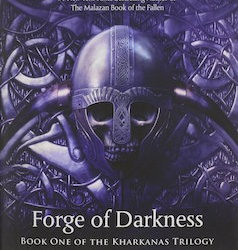
Okay, after roughly a decade of nagging and peer pressure from a friend who adores the series (and has the terrible curse of often recommending stuff I end up loving in the least appealing-to-me ways possible), I finally broke and agreed to read some Malazan. But a ten-book series of thousand page tomes was still too much, so, the prequels trilogy! Or the first volume of it, anyway.
So, this was a, as they say, real fantasy chonker. Nine hundred pages, like literally over a dozen POVs, unexplained but extremely detailed magic systems and worldbuilding and so. Many. Proper. Nouns. Being a prequel, it’s also literally set before humans existed, as far as I can tell – the main caste is all what were described to me as the setting’s elves (well, the overwhelmingly majority of them, anyway). Also, 900 pages long. Which is just too long for a single book, I think.
Anyways, given all that, surprisingly readable? Not necessarily objectively – it was absolutely a slog at times – but compared to what you might expect from a story that expects you to pick up the meaning and significance of every bit of jargon by use and context and will loop back to any given POV every hundred pages or so, if you’re lucky. You could fit the number of names I remember on one hand, but the book does a good job of giving you enough context and providing enough little reminders that I could remember who any given POV/what any given plot thread was within a paragraph or two of being dumped back into it, anyway. (Except Ursander’s captains. Like, I know they got characterizations but relying on social rank and narrative role to tell people apart really failed on the five different ones running around doing genocide or atrocity to start a civil war).
Plot wise it’s an awkward but interesting halfway point between brutal gritty realpolitik and mythic epic fantasy? Like, the better part of the plot in concerned with aristocratic decadence and Machiavellian scheming and a seemingly inevitable slide toward civil war and all that, but also the only reason any of that could happen is because the guy who could probably fight every army involved singlehandedly was out of town that month trying to do some father-son bonding/accidentally sponsoring a demigod who invented blood magic and human sacrifice to complete his commission of a present for his girlfriend. Or the careful diplomacy around noble hostage-taking being almost derailed because there are three kids who are just actually immortal demons and decided to kill everyone in the castle and go on a trip. The two tones interact in interesting ways at points, and lead to some real tonal dissonance at others.
There is some thematic purpose to that, I think – there’s absolutely a recurring motif of people with power and influence refusing to use it, and ostensible subordinates acting in their name running around and making everything worse in ways they did not understand or approve of while they sat around. From one lens the whole book is one long warning about the horror of delegated authority. Or even broader than that – the distance between someone’s reputation or how they’re regarded, what they think their reputation is, and who they actually are comes up a lot. So much angst and miscommunication.
Beyond that, the best way to describe the plot is ‘three different standard epic fantasy pseudo-chosen one plots happening independently and possibly mutually exclusively, and also a bunch of different views of a pretty fucked society sliding into complete bloody anarchy and religious genocide.’
Character-wise – well, the downside of having so many POVs is that even when there is enough wordcount to actually give several of them real depth and development, it’s incredibly easy to miss it. So it’s utterly possible that there was tons of subtle and nuanced character work I totally failed to notice, but as far as my actual reading experience went most of the arcs were fairly broad and obvious, and focused on the really larger than life operatic characters. (Though as far as somewhat generic fantasy stories go, Korya and Haut are the best and I won’t be accepting disagreement on this.)
Like I’m fairly sure every big fantasy chonker in existence, the book’s ever so slightly Weird about sex. Also one rather extreme (and plot-critical) bit of on-screen sexual violence, though that’s thankfully not the bit the book’s weird about.
The setting was interesting, though buried under so much jargon and proper nouns that it took a fair bit of page count before you begin to understand absolutely any of it. Still, the sea of chaos and the savanna of razor-sharp grass were both really vividly described, even if there’s no chance in hell that I could tell you what their names were.
I really did enjoy the book, on the whole, but it was also kind of an exhausting read? The whole book’s got the whole pseudo-archaic tone and vocabulary you expect from map fantasy, which did help sell it but also do make reading it a bit more of a slog.
Overall, I mean, does ‘extra-worldbuilding heavy prequel set in the lost mythic age of an already famously and world-building heavy fantasy world’ appeal to you? Because if so this book absolutely lives up to expectations. But I’m not going to read anything over 500 pages for a solid bit now, I think.
17 notes
·
View notes
Text
I love how Bruce tells Duke to guard the Cave & Duke goes "Yes, sir. You got it. Not a single goddamm person is getting into this Cave." Like he takes it so seriously that when the GREEN LANTERN shows up, Duke doesn't think "Hm. He probably has a good reason for being here. Maybe I should ask him?"
No.
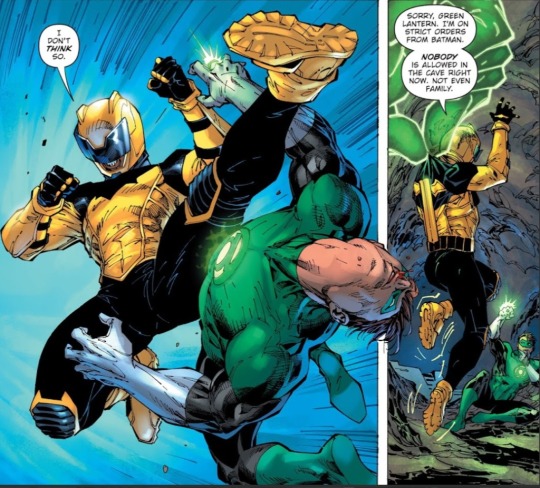
He DROPKICKS HIS ASS.
14K notes
·
View notes
Text

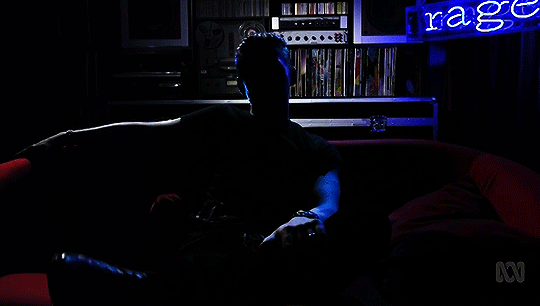

tobias daddy interview or whatever
#i‘m sorry it‘s just so funny because the daddy vibes are just insane here lmao#sitting in the dark barely lit room woth hisbslicked back black hair arm draped over the couch and legs open swung over each other???#like DAYYUMMMM#i can see through the queue inside you#tobias forge#ghost#ghost band#copia#myedit#papa emeritus#ghesties#the band ghost#ghost sweden#papa emeritus iv
471 notes
·
View notes
Text

listening to to opeth n drawing mary goore>>
#the band ghost#ghost#fanart#repugnant#mary goore#mary goore fanart#epitome of darkness#mary goore art#digital art#nameless ghouls#ghost bc#the band ghost fanart#copia#cardinal copia#papa emeritus iv#tobias forge#tobias forge fanart#meliora#namelessghoulettes#digital drawing#mummy dust#my art#procreate
299 notes
·
View notes
Text
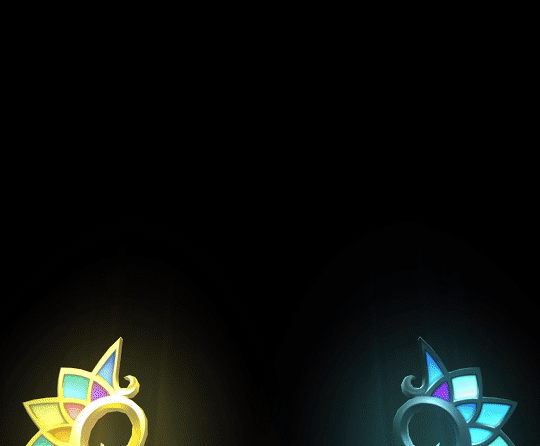
#kingdom hearts dream drop distance#khddd#sora#riku#nightmare's end#mirage split#my gif#i was going to write up a whole thing in the tags about my thoughts on this keyblade#but i just know it'll be an incoherent essay because i can't properly articulate my thoughts#the x-blade must be forged through a clash of light and darkness#but i find it so highly significant that sora and riku can create their own keyblade which is so unheard of#this keyblade isn't created with a clash but rather through harmony and balance#not with conflict but with understanding and connection and love#and i always felt as though that's how the x-blade SHOULD be forged. that master xehanort went about it all wrong#because balance and connections are such important themes in these games#it has two handles and looks so regal when combined. all of the shapes feel reminiscent of the x-blade too#it shines so brilliantly with both sora and riku's symbols. the heart and crown which is the iconic logo for the entire series#also the way stained glass is always used to represent hearts. it's so significant!#and yeah the paupu fruit keychain is its own thing to unpack#okay so i ended up writing something anyway but there's still so much more#i just really hope we get to see more of this in future games because it would be shocking if it was nothing more than a cool combo attack
1K notes
·
View notes
Text

Conveniently, hereteks differentiate themselves from faithful mechanicum by wearing black robes for ease of recognition.
You'd think that it would be something overt like the extra guy grafted to his back or the lingering stench of contraseptic and rotting meat but, no. Those are normal techpriest things.
#games workshop#forge world#warhammer 40k#necromunda#adeptus mechanicus#dark mechanicum#heretek#hired gun#book of ruin#warhammer community
257 notes
·
View notes
Text

I hope this Papa drawing I did a while ago blesses my return to Tumblr 🙏
#art#halloween#fanart#fan art#ghost#the band ghost#ghost bc#terzo#papa terzo#terzo emeritus#ghost terzo#papa iii#papa emeritus iii#papa emeritus lll#terzo my beloved#drawing#drawtober#tumblr draw#artists on tumblr#artwork#digital art#illustration#dark aesthetic#dark art#tobias forge#my art
1K notes
·
View notes
Text

“Not just another bloody Mary…” 🖤✨🦇
Gouache value study of Mary!!! Once I turn this in for my grade I’m going to add black glitter to his blood cuz nothing screams metal like glittery blood 🖤✨🦇 also… 53 MORE DAYS TILL HALLOWEEN! STAY SPOOKY EVERYGHOULIE!!! ✨🦇🎃💜
#the band ghost#ghost fanart#trad art#nameless ghouls#my artwork#papa emeritus iv#copia#papa iv#artists on tumblr#acrylic gouache#gouache#mary goore#i love repugnant#repugnant band#repugnant#ghost ghouls#ghost the band#ghost band#ghost bc#my artwrok#he’s so comforting#artist#small artist#tobias forge#value study#epitome of darkness#hecatomb#i love them to death#Mary gooregeous#ghost fan art
330 notes
·
View notes
Text

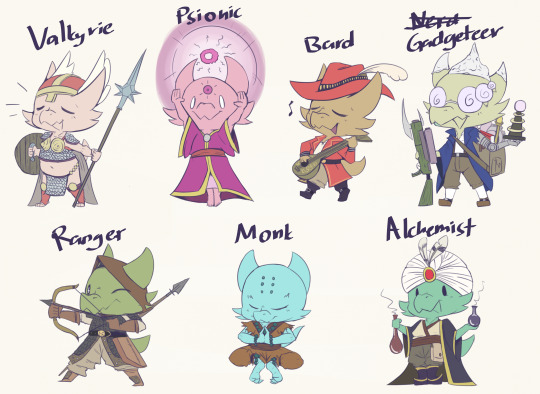
Wizardry 6-8 classes but Kobolds! Who would you bring to your party to the stars and into the Cosmic Circle?
#cute#fantasy#kobold#doodles#oc#wizardry 8#wizardry#bane of the cosmic forge#crusaders of the dark savant#rpg#dungeon crawler#scalie#wizardy vi#wizardry vii#wizardry 6#wizardry 7#wizardry viii#drpg#video games
219 notes
·
View notes
Text
In the last few days, I've now had two run-ins with people on this site regarding the idea of a TTRPG's mechanics and rules impacting the roleplay aspect of said game. And from what I can tell, these people - and people like them - have the whole concept backwards.
I think people who only ever played D&D and games like it, people who never played a Powered by the Apocalypse or Forged in the Dark system, or any other system with narratively-minded mechanics, are under one false impression:
Mechanics exist to restrict.
Seeing how these people argue, what exactly they say, how they reason why "mechanics shouldn't get in the way of roleplaying," that seems to be their core idea: Rules and mechanics are necessary evils that exist solely to "balance" the game by restricting the things both players and GMs can do. The only reasons why someone would want to use mechanics in their RPG is to keep it from devolving into
"I shot you, you're dead!" "No, I'm wearing bulletproof armor!" "I didn't shoot bullets, I shot a laser!" "Well, the armor's also laserproof!" "Nuh-uh, my lasers are so hot that they melt any armor!" "My armor's a material that can't melt!" And so on. Because we have rules, the players can't just say "we beat this challenge", and neither can the GM say "you haven't beaten this challenge." Because the rules are clear, the rules are obvious, the rules tell you what you can and can't do, and that's it.
So obviously, when the idea of mechanics directly interacting with the roleplay - generally seen as the most free and creative part of a TTRPG - seems at best counterintuitive, at worst absolutely wrong. Hearing this idea, people might be inclined to think of a player saying "I'm gonna do X", just for the evil, restrictive mechanics to come in and say "no, you can't just do X! you first have to roll a Do X check! But you also did Y earlier, so you have to roll the Did Y Penalty Die, and if that one comes up higher than your Do X die, you have to look at this table and roll for your Doing X If You Previously Did Y Penalty! But, if you roll double on that roll..."
But like... that's not how it works. Roleplay-oriented mechanics don't exist to restrict people from roleplaying, they're there to encourage people to roleplay!
Let's go with a really good example for this: The flashback mechanic from Blades in the Dark (and games based on Blades in the Dark).
In BitD, you can declare a flashback to an earlier point in time. Could be five minutes ago, could be fifty years ago, doesn't matter. You declare a flashback, you describe the scene, you take some stress (the equivalent of damage) and now you have some kind of edge in the present, justified by what happened in the flashback. For example, in the Steeplechase campaign of the Adventure Zone podcast, there was a scene where the PCs confronted a character who ended up making a scandalous confession. One of the players declared a flashback, establishing that, just before they walked in, his character had pressed the record button on a portable recording device hidden in his inner coat pocket. Boom, now they have a recording of the confession.
How many times have you done something like this in a D&D game? How many times did your DM let you do this? I think for most players, that number is pretty low. And for two reasons:
The first, admittedly, has to do with restrictions. If you could just declare that your character actually stole the key to the door you're in front of in an off-screen moment earlier, that would be pretty bonkers. Insanely powerful. But, because BitD has specific mechanics built around flashbacks, there are restrictions to it, so it's a viable option without being overpowered.
But secondly, I think the far more prevalent reason as to why players in games without bespoke flashback mechanics don't utilize flashbacks is because they simply don't even think of them as an option. And that's another thing mechanics can do: Tell players what they (or their characters) can do!
Like, it's generally accepted that the players only control what their characters do, and the GM has power over everything else. That's a base assumption, so most players would never think of establishing facts about the larger world, the NPCs, etc. But there are games that have explicit mechanics for that!
Let's take Fabula Ultima as another example: In that game, you can get "Fabula Points" through certain means. They can then spend those points to do a variety of things. What's literally the first thing on the list of things Fabula Points let you do? "Alter the Story - Alter an existing element or add a new element." I've heard people use this to decide that one of the enemies their group was just about to fight was actually their character's relative, which allowed them to resolve the situation peacefully. I again ask: In your average D&D session, how likely is it that a player would just say "that guy is my cousin"? And if they did, how likely is it that the GM accepts that? But thanks to the Fabula Point mechanic making this an explicit option, thanks to rules explicitly saying "players are allowed to do this", it opens up so many possibilities for story developments that simply would not happen if the GM was the only one allowed to do these things.
And it's only possible because the mechanics say it is. Just how your wizard casting fireball is only possible because the mechanics say it is.
#ttrpg#ttrpgs#tabletop rpg#tabletop rpgs#blades in the dark#forged in the dark#bitd#fitd#fabula ultima
673 notes
·
View notes
Text
In her youth, Hish Tulla had given her heart away with what others had seen as careless ease, as if it were a thing without much worth, but it had not been like that at all. She'd simply wanted it in someone else's hands.
-Forge of Darkness, by Steve Erickson
9 notes
·
View notes
Note
wait wait wait sorry not tryign to be rude why are you starting with forge of darkness I think you're supposed to start with the main series (malazan book of the fallen, starting with gardens of the moon). the kharkanas books are prequels but everyone I've seen said to read it after the main series lol
but yea malazan books are just Like That lol I'm on the third book and I tend to find that the first sections of the books are a bit slow going bc they're the. setup I guess? for a lot of POVs but you get used to it + iirc the beginning of gardens of the moon weren't that dense with POVs lol so
Oh, I just told the friend getting on my case to try Malazan outright that I wasn't reading a 10-book series, so this was the compromise. Also they're apparently better written than the early mainline books?
tbh 'court intrigue and feudal politicking as the civil war that will spel the of the totally-not-elves glorious mythic age' is a more compelling pitch to me than what's being explained of Gardens of the Moon anyway.
(and I like big sprawling multi-POV casts, even if this might be somewhat excessive :P )
15 notes
·
View notes
Text

@martianworder asked me about this on my Forged in the Dark post, so here we go!
Clocks
So Clocks have been a tool that have been used before and outside of Blades in the Dark, but BitD was where I think they were made really popular.



Golem Clocks designed by cmartins on Itch.io
For all intents and purposes, a Clock is just a track that you fill, but in some cases it's preferred over a track because it fills less space, and it's easy to just draw a clock on a piece of paper to help you keep track of something as you play.
A Clock can be more than just a track. It can be a countdown, a timer, or a representation of a person or faction's goals. The larger the Clock, the bigger task it is. Here are some examples of how you could use them.

A Healing project clock from Blades in the Dark.
A player could have a project Clock that they fill over the course of many sessions. Perhaps they want to research a cure for a vampire virus that is threatening a loved one. The GM would ask them to make a research roll every downtime, and how successful they are indicates how many slices they fill - effectively, how much progress they make towards finding a cure.
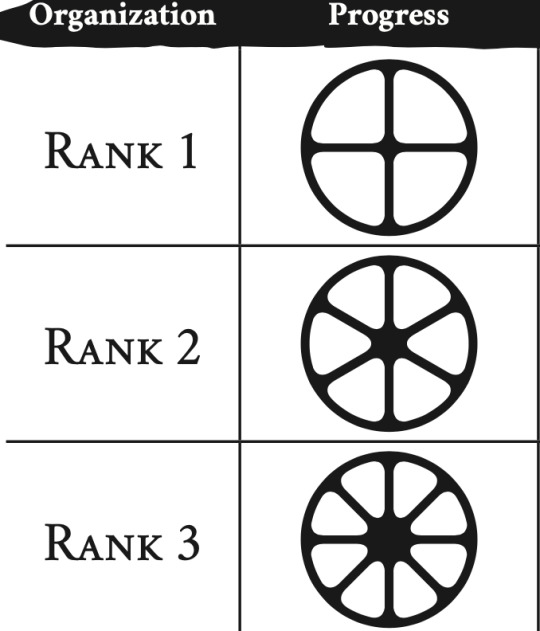
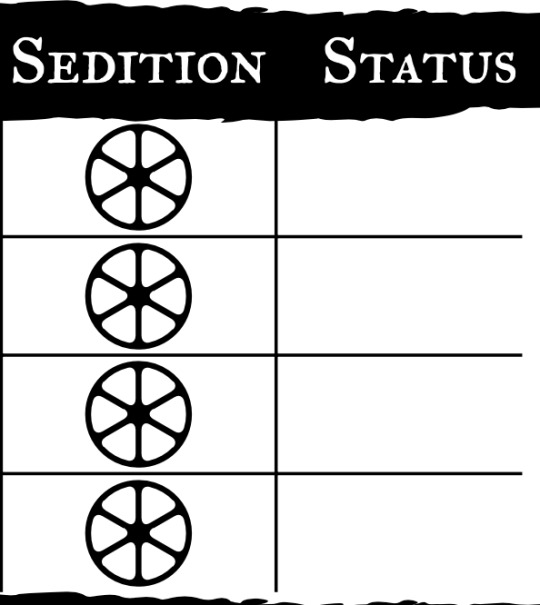
Rebellion and Sedition Clocks for Brinkwood: Blood of Tyrants.
A play group might use a Clock to track a common goal, such as winning over a number of anarchists to help take down a mega-corporation. If this is a campaign-long goal, you might use a series of linked clocks to represent the jailbreak you need to assist before you can win over a computer hacker, and then the massive hacking project you need to support before you can overwhelm the corpo servers.



Faction Clocks from Scum & Villainy.
A GM might use a Clock to track the work a Faction makes towards their goal. Every downtime section, they GM might roll to see how successful the Faction is, or simply tick one slice of the clock if the Faction has no reason not to be able to do what they want. If the Faction is allowed to work unimpeded by the PC's, they might eventually do something that changes the world around them, for better or worse.
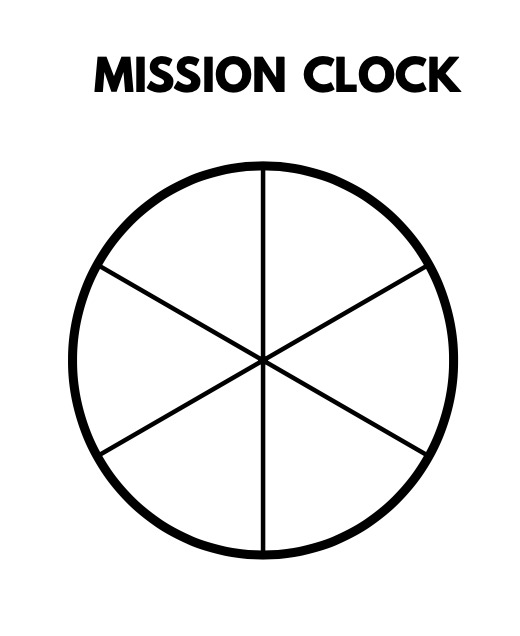
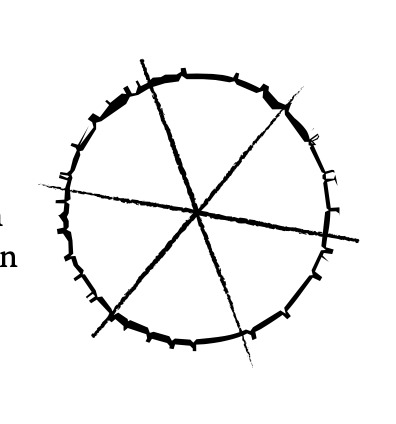
Mission Clock from External Containment Bureau and Doomsday Clock from Apocalypse Keys.
Clocks might also be used as a timer, to indicate when something terrible might happen, or when the group's time is up. This might be the amount of time before a murderer next strikes, before the haunted house claims another victim, or before the world begins to end. In some games, specific points in the clock (such as halfway, or a quarter of the way through) may trigger special events that give the PC's more information, or remind the group that the pressure is really on.

Clocks for Protect the Child.
All in all, Clocks are a great visual tool to help you and your game group keep track of what's going on in the fiction, and it can also help you keep track of a number of narrative threads in a fairly condensed space. Even if they're not built into the game you're currently running or playing, I think they're a fairly easy addition, and can certainly help with bookkeeping!
545 notes
·
View notes
Text





















SHERLOCK | Martin Freeman as John Watson
#inspiration for creating gifs was the wonderful @meandhisjohn#he emerged from the mist like a ghost with sadness etched on his face like the imprint of a recent storm#In his eyes a shadow of despair lingered but at the same time an unrelenting thirst for life beat in his heart#the world around him seemed empty a lifeless canvas devoid of color and sound#his brown jacket rough and worn a symbol of the storm raging within his soul gave him a harsh yet captivating appearance#and at that momen like a beacon of light in utter darkness he met him#their gazes met and the world around them burst into vibrant hues#as if a painter inspired by a divine muse had poured his palette onto the canvas#john lost in the abyss of despair suddenly found purpose meaning in his existence#he was like a ship tossed about in a tempest finding sanctuary and calm in a harbor#their encounter became a turning point illuminating his life with a gentle light comparable to the first rays of dawn#breaking through the darkness of night#love immense and unfathomable enveloped their hearts forging them into one#It was like a magical elixir awakening forgotten feelings and dreams#martin freeman#mf/serial#bbc sherlock#john watson#sherlock#sherlock bbc#benedict cumberbatch#pilot
229 notes
·
View notes